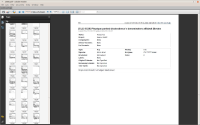-
Suggestion
-
Resolution: Fixed
-
310
-
57
-
-
NOTE: This suggestion is for JIRA Server. Using JIRA Cloud? See the corresponding suggestion.
We would like to have the ability to archive old issues. We currently have an installation of JIRA (3.0.3) that has grown to 50,000 + issues. Out of these, about 35k are closed issues. We would like to be able to remove these issues from the database so that our installation has a smaller amount of issues. As an example, all issues that are more than 90 days old would be removed from the database, but they would still be useful for a Knowledge Base.
To summarise, a feature that would remove or export issues (with comments) of certain age would be very useful.
- causes
-
JRASERVER-67235 ATST - remove LuceneSupportHealthCheck as it become obsoleted
- Closed
-
JRASERVER-69225 Filters on export archive page
- Closed
- is duplicated by
-
JRASERVER-4404 Archive Project
- Closed
-
JRASERVER-13129 Archiving too old closed issues
- Closed
-
JRASERVER-28384 Request to add a new "decay" feature for JIRA issues...
- Closed
- is incorporated by
-
JRASERVER-1450 Project status - archive project
- Closed
-
JRASERVER-67413 Project status - archive project
- Not Being Considered
- is related to
-
JRASERVER-1450 Project status - archive project
- Closed
-
JRASERVER-11628 Spam prevention: prevent comments on old issues
- Closed
-
JRASERVER-14228 permanently keep deleted attachment - attachment graveyard
- Closed
-
JRASERVER-67413 Project status - archive project
- Not Being Considered
-
TAM-1997 Loading...
- relates to
-
JRACLOUD-5843 Ability to archive issues
- Closed
-
JRASERVER-41478 Create documentation about "Archiving a Project" for Atlassian OnDemand
- Closed
- mentioned in
-
Page Loading...
-
Page Loading...
-
Page Loading...
-
Page Loading...
-
Page Loading...
-
Page Loading...
-
Page Loading...
-
Page Loading...
-
Page Loading...
-
Page Loading...
-
Page Loading...
-
Page Loading...
-
Page Loading...
-
Page Loading...
-
Page Loading...
-
Page Loading...
-
Page Loading...
-
Page Loading...
-
Page Loading...
-
Page Loading...
-
Page Loading...
-
Page Loading...
-
Page Loading...
-
Page Loading...
-
Page Loading...
-
Page Loading...
-
Page Loading...
-
Page Loading...
-
Page Loading...
-
Page Loading...
-
Page Loading...
-
Page Loading...
-
Page Loading...
-
Page Loading...
-
Page Loading...
-
Page Loading...
-
Page Loading...
-
Page Loading...
-
Page Loading...

Closing this ticket annoying since we have on on-premise server and over 1M tickets with no easy or quick way to archive the closed tickets.